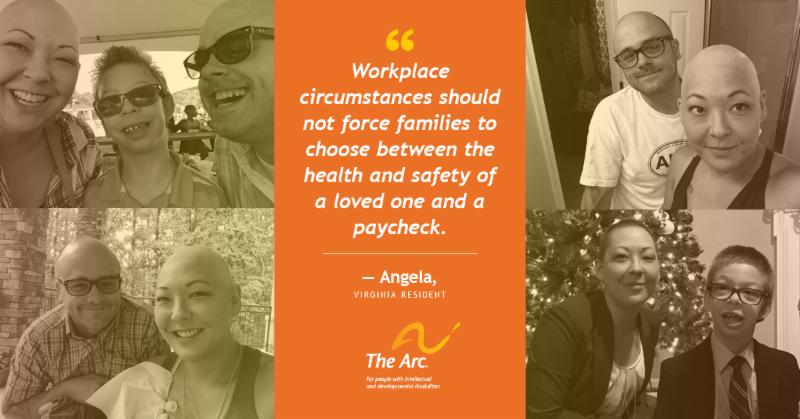
Paid Family and Medical Leave – the Disability Angle

Autism Resource for parents, teachers, employers and individuals | National initiative of The Arc

 This week, The Arc’s Center for Future Planning released videos as well as easy-to-read and detailed information for people with disabilities.
This week, The Arc’s Center for Future Planning released videos as well as easy-to-read and detailed information for people with disabilities.With the House passage of the American Health Care Act (AHCA), the bill is now being reviewed in the Senate. The Senate has formed a 13-member working group composed of Majority Leader Mitch McConnell (R-KY), Majority Whip John Cornyn (R-TX), and Senators John Thune (R-SD), John Barrasso (R-WY), Lamar Alexander (R-TN), Mike Enzi (R-WY), Orrin Hatch (R-UT), Ted Cruz (R-TX), Mike Lee (R-UT), Tom Cotton (R-AR), Cory Gardner (R-CO), Rob Portman (R-OH), and Pat Toomey (R-PA). Major areas of disagreement between Senate Republicans include the structure of tax credits, Medicaid per-capita caps, Medicaid expansion, essential health benefits, and pre-existing conditions. The Arc has released a fact sheet on the harmful impact of the AHCA on people with disabilities. The Congressional Budget Office is expected to provide cost information on the AHCA early in the week of May 22.
Click here to watch the latest in The Arc’s series of videos on the critical importance of health care and Medicaid to people with intellectual and developmental disabilities and their families. Please share with your networks.
 |
Since its inception, The Arc has been on the forefront of special education advocacy. Many chapters of The Arc provide individual advocacy services for students with intellectual and developmental disabilities (I/DD). However, academic achievement and graduation rates of students with I/DD continue to lag far behind their peers without disabilities, making advocacy efforts more important than ever. To aid in this effort, The Arc@School launched an Online Resource Center in December 2016.
|
Congress has begun the process of repealing the Affordable Care Act (ACA) and it now is on the fast track to include drastic cuts to the Medicaid program as part of the replacement plan. The House of Representatives will start on legislation in the next few weeks.
People’s health, services, and lives are at stake! What can you do now?
 As 2016 comes to a close, families and individuals with autism are reflecting on all they have accomplished this year. The Arc is also looking back on all it has achieved through their chapters and members. We recently asked members to think about their own lives and answer what achievement means to them. Here are some of their responses:
As 2016 comes to a close, families and individuals with autism are reflecting on all they have accomplished this year. The Arc is also looking back on all it has achieved through their chapters and members. We recently asked members to think about their own lives and answer what achievement means to them. Here are some of their responses:
Achievement means many things to different people. We hope you will take a moment to consider making a gift to make achievement possible for millions of individuals with intellectual and developmental disabilities and their families this year.
For people with autism, assistive technology can be an avenue to independence. This past October, one chapter took a giant step in ensuring this vital resource is available to people on the spectrum for years to come. Thanks to the Comcast Foundation, The Arc Prince George’s County now has funding to create a Learning Lab, offering assistive technology (AT) training for individuals with intellectual and developmental disabilities (I/DD).
Shortly after receiving the award, the organization hosted an open house on October 18. Attendees received a tour of the Comcast NBCUniversal Learning Lab, as well as listened to remarks from Jim Coleman, President and CEO of Prince George’s County Economic Development; Rob Malone, Executive Director of The Arc Prince George’s County; and Deborah Goins, Director of Employment Services for the Arc Prince George’s County. If you would like to learn more, please view this video.
 Building upon the ABLE Act of 2014, three amendments were introduced in the House and Senate in March 2016, and referred to the appropriate committees of jurisdiction. Unfortunately, they have not seen any legislative progress since that time. With time running out for Congress to act this year, we can’t be complacent — we must educate ourselves and others on their significance. Here is a brief summary of each:
Building upon the ABLE Act of 2014, three amendments were introduced in the House and Senate in March 2016, and referred to the appropriate committees of jurisdiction. Unfortunately, they have not seen any legislative progress since that time. With time running out for Congress to act this year, we can’t be complacent — we must educate ourselves and others on their significance. Here is a brief summary of each: